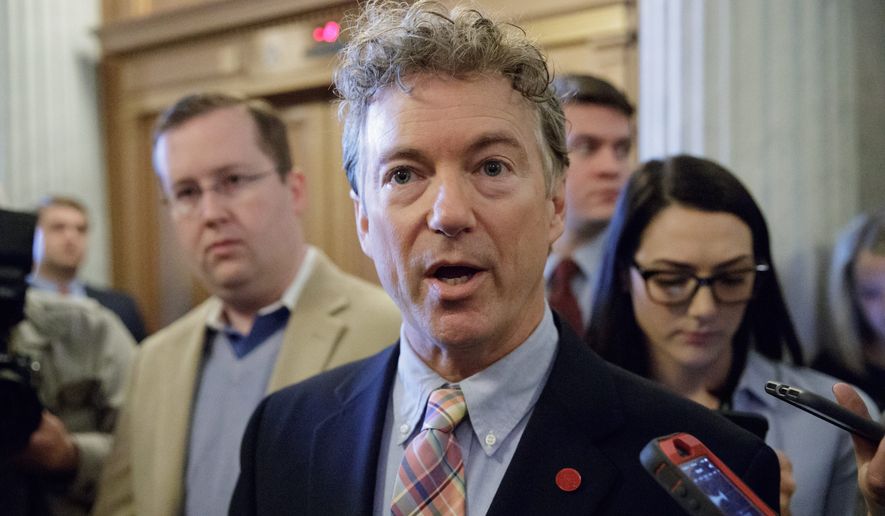Sen. Rand Paul sounded one of the more discordant notes last week after President Trump’s retaliatory missile strike against the Syrian regime, suggesting it was ill-advised and illegal, and insisting Congress needs to get involved.
But after years of gridlock, the Kentucky Republican acknowledged there is little hope that Capitol Hill will take up the issue or, if it does, that it will do any better this time. Asked what it would take, his answer was succinct: “Different colleagues.”
The strike against an airfield that the U.S. says was the staging point for last week’s chemical weapons attack on civilians has reignited the debate over U.S. policy in the region — and over how much authority the president has to act without having to go to Congress.
A small but vocal group of lawmakers, including Mr. Paul, said Mr. Trump’s missile strikes were illegal and insisted that any military action against a government that hasn’t attacked the U.S. must get congressional approval first.
“Having served on active duty as a JAG, I am well aware of the legal authorities for the use of military force. President Trump’s unilateral decision to launch 59 Tomahawk missiles at another country’s military — which had not attacked the U.S. — was unconstitutional,” said Rep. Ted Lieu, a California Democrat who is still a colonel in the Air Force Reserve and a member of the Judge Advocate General’s Corps.
But the vast majority of lawmakers on Capitol Hill said the series of strikes was a properly proportionate response to the horrific use of nerve gas agents on President Bashar Assad’s own people.
“I thought it was very clear what this strike was about. You don’t use chemical weapons without consequences. I think that’s a pretty clear message, and I don’t necessarily read into that a larger strategy in the area,” said Senate Majority Leader Mitch McConnell, Kentucky Republican.
Mr. Trump’s decision to enforce the red line, first clumsily drawn by President Obama, took Washington by surprise. After years of warning that the U.S. should stay out of the Syrian mess, Mr. Trump said the photos of children suffering from the chemical attack were too much for the civilized world to tolerate.
Some lawmakers are worried about the next steps and appear eager to pin down the policy of a president who just days ago said he wasn’t concerned about Mr. Assad.
“We cannot stand by in silence as dictators murder children with chemical weapons,” said Rep. Steve Russell, Oklahoma Republican, and Rep. Seth Moulton, Massachusetts Democrat, who are chairmen of the Warrior Caucus of combat veterans in Congress.
“But military action without clear goals and objective gets us nowhere. We look forward to hearing the president present a plan for Syria to the American people, for Congress to agree on bipartisan action, and for America to partner with the world community to help bring this treacherous conflict to an end,” the two lawmakers said.
Sen. Christopher Murphy, Connecticut Democrat, said Mr. Trump appeared to be “free-styling” in his approach to Syria and showed disdain for Congress’ war-making authorities.
“If you can’t get an authorization of military force from Congress to strike in Syria or another country in the Middle East, then you shouldn’t do it,” Mr. Murphy said.
House Minority Leader Nancy Pelosi, California Democrat, demanded that Republicans cancel a two-week spring break and reconvene the House to debate military policy in Syria.
“As heartbreaking as Assad’s chemical weapons attacks on his own people was, the crisis in Syria will not be resolved by one night of airstrikes,” she said. “The killing will not stop without a comprehensive political solution to end the violence.”
The U.S. has conducted nearly 8,000 strikes against targets in Syria since Mr. Obama first committed the military to operations in the country in 2014. Those strikes were targeted at the Islamic State. Mr. Obama also committed a small number of American troops to help rebels fight the Islamic State group, and Mr. Trump last month boosted the number of those troops.
But the U.S. airstrikes were the first directed specifically against the Syrian regime, leaving a number of lawmakers to say it went beyond the powers that Congress granted in the 2001 Authorization for the Use of Military Force that gave presidents the power to target al Qaeda, the Taliban and affiliated international terrorist organizations.
First Mr. Obama and now the Trump administration argue that the Islamic State is an offshoot of an offshoot of al Qaeda.
Lawmakers on Capitol Hill have long disputed that assertion.
In 2015, after years of heckling from Congress, Mr. Obama wrote his own proposed AUMF for Syria and the fight against the Islamic State and sent it to Capitol Hill. Some members of Congress said it went too far, another faction said it didn’t go far enough — and the legislation was quickly shelved, leaving the president with a free hand to continue.
Mr. McConnell didn’t seem eager to restart the AUMF debate this year and said it is up to Mr. Trump to decide if he wants more war powers.
“If the president can think of some AUMF that he thinks strengthens his hand, I’d be happy to take a look at it,” Mr. McConnell said.
• Stephen Dinan can be reached at sdinan@washingtontimes.com.




Please read our comment policy before commenting.